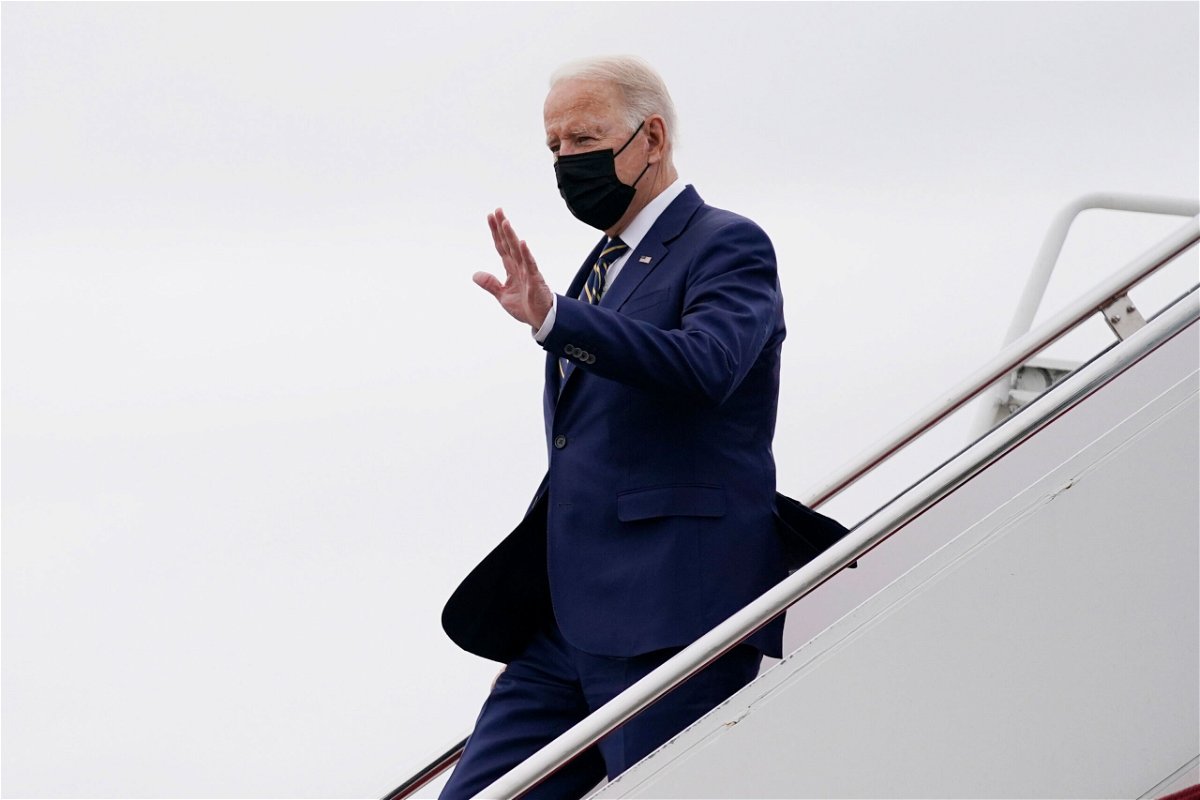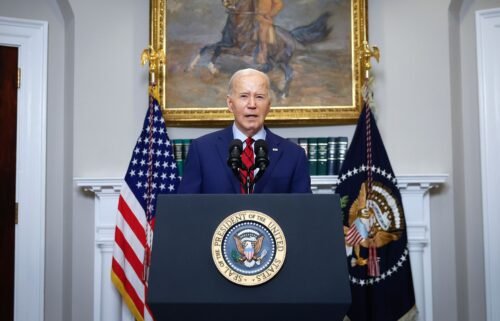This is the week that Biden might actually clinch the deal on his legislative agenda. Seriously.

President Joe Biden arrives at Edinburgh Airport to attend the COP26 U.N. Climate Summit
By Lauren Fox and Phil Mattingly, CNN
President Joe Biden’s sweeping $3 trillion domestic agenda is finally coming together.
No, seriously.
After months of negotiations and a series of setbacks between disparate corners of his own party, Biden is on the cusp of clinching not one but two massive legislative achievements with sources on all sides signaling the clear goal and momentum to finalize everything this week.
But it’s not a done deal yet, and as we’ve seen repeatedly, the trust deficit between moderates and progressives is fully capable of pushing Biden’s agenda off track. Democrats are still working through some internal disagreements over Medicare expansion, immigration and prescription drug pricing, and even once all parties agree to a deal, legislative text has to be finalized, members have to actually read the bill and then they will vote.
The bottom line is that Democrats still have some work to do, but if Biden and Democratic leaders can pull off an agreement over the next 72 hours, they will have made a massive dent in reshaping the role the US government plays in family life — not to mention be on the verge of investing in crumbling physical infrastructure around the country.
The plan may not include everything Democrats campaigned on. Major concessions were made to appease just two US senators that may fly in the face of years worth of campaign promises, but together the $1.75 trillion social safety net package paired with the $1.2 trillion infrastructure bill represent two of the biggest investments a president has ever gotten passed in year one of his presidency.
What to watch: The last remaining sticking points right now are negotiations over prescription drug pricing, how to assuage members who have argued they can’t back legislation that doesn’t include immigration when the Senate parliamentarian has said twice proposals won’t pass Senate rules and whether there is any more Medicare expansion that West Virginia Sen. Joe Manchin and Budget Chairman Bernie Sanders, independent of Vermont, can agree upon. Once all that is finished, the House Rules Committee will move to meet. That is the real signal this floor process in the House is getting started.
The all-important caveat
Those sticking points are serious and — while sources make clear there has been real progress in addressing them — the process of reaching an agreement, then running it by everyone, then the drafting of legislative text is arduous and painstaking. It goes beyond just the big outstanding issues — in every page of the 1,600-page draft proposal released last week there was opportunity for some member to take issue and call for a rewrite.
Just a regular reminder that when it comes to legislative negotiations and actually getting to a vote, always take the over.
A driving factor
The looming debt limit and government spending deadlines are looming over every moment of these negotiations. White House officials and Democratic leaders desperately want to avoid rolling the domestic agenda into the December 3 deadline for those other two major issues. In order to avoid that, sources say it’s almost certain things would have to start to move in the House this week. That’s something to keep in mind.
Where Biden stands
“I believe we will pass my Build Back Better plan and I believe we will pass the infrastructure bill,” Biden told reporters before departing the G20 Summit in Rome. Biden also said he believed the bills would be passed by the end of this week.
Despite the failed major push to have legislative victories in hand before arriving in Rome and, now, Glasgow for the UN Climate Conference, the $1.75 trillion framework has served as something Biden and his top advisors can point to as a clear, black-and-white proposal that represents where things are going. It isn’t law, and there was no bill signing, but it’s clearly become a tool for Biden overseas.
An important reminder
Once the House passes the Senate- passed bipartisan infrastructure bill, it will go to the President’s desk for his signature.
Once the House passes the larger social safety net bill, it still has to go through the Senate. That process is lengthy and will force senators to endure an all-night marathon voting session known as vote-a-rama. Republicans aren’t going to go easy on them and are prepared to drag that session out for as long as they possibly can. Once the House votes on the $1.75 trillion plan, it’s not quite over and the vote in the Senate is likely to come later (maybe much later) than whatever the House does.
What happened over the weekend: On Friday, Democrats had once again missed a self-imposed deadline. The President was overseas and the cusp of heading to Scotland without a firm commitment from his party that they’d ever pass his climate plan, and everyone from progressives to moderates were deeply frustrated and tired of a cycle of dysfunction they’d fallen into. But House Speaker Nancy Pelosi never stopped working the phones. And Democratic leaders continued to tell members that she wanted to make the push for a vote as early as Tuesday. Pelosi also reached out over the weekend to Arizona Democratic Sen. Kyrsten Sinema about some Democrats’ desire not to give up just yet on including prescription drug pricing in the bill.
The issue had been a delicate one for the speaker who had progressives in her caucus who were desperate to include it and a handful of moderates who had wanted to water the original proposal down. The efforts to find a middle ground had been playing out for weeks. A compromise had been brokered by the White House and a handful of members, but that proposal didn’t get sign off from critical Democrats and was scrapped from the President’s framework.
What has ensued is a small number of Democrats working overtime to try and broker a compromise on the issue.
Progressives and moderates mend the trust deficit
In the last several days, progressives have found themselves more assured that Sinema and Manchin are actually going to be there. That paired with the promise from the President of the United States that he’d make sure it happens has gone a very long way.
A few days of assurances doesn’t heal 10 months of wounds, but it’s clear things are moving in the right direction for the White House and Democratic leaders, officials say.
The-CNN-Wire
™ & © 2021 Cable News Network, Inc., a WarnerMedia Company. All rights reserved.




